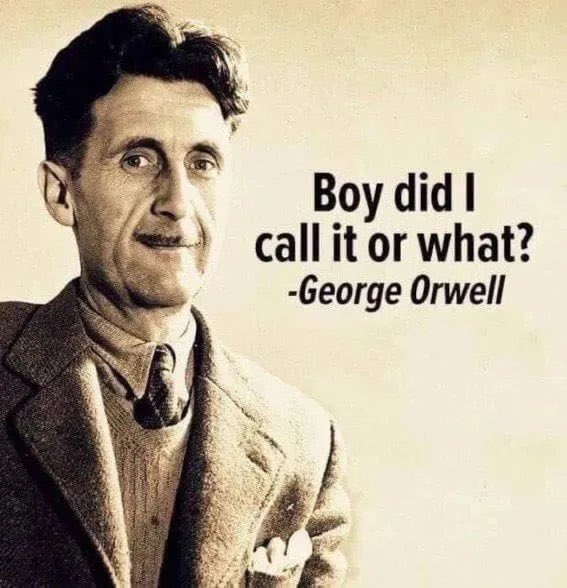Officials with the lowest approval ratings in the world (Macron, Starmer, Merz, Sanchez) are the loudest champions of social media bans for teens and ‘misinformation’ crackdowns.
|
|||||
|
Surveillance states don’t drop from the sky. They emerge alongside seemingly reasonable excuses that do not ring alarm bells for the ordinary citizen, piggybacking on genuine issues that are of concern to the public. In this case, with breathtaking cynicism, labour are using people’s justified concerns about immigration and the rise in crime to impose what Mahmood unironically describes as a panopticon state upon law-abiding citizens, whilst – typically for this government – doing nothing to address the root cause. – Eve Lugg We are only, here in the UK, at the very beginning of the process of descent into tyranny. But it is helpful to frame our thinking with this in mind: that is our trajectory if we continue to imagine that state authority can be founded in political hedonism, or the unity of desire. And it is also helpful for us therefore to imagine how things can be different: what is the proper grounds for the authority of the state, and how are states indeed properly constituted? The answer, for those who know their political theory, is the antithesis of tyranny: the rule of law. But it is the rule of law understood in a special way. It does not mean the ‘rule of lawyers’ (which we are now highly familiar with). It means something much more specific than that. – David McGrogan (£) “When I was in justice, my ultimate vision for that part of the criminal justice system was to achieve, by means of AI and technology, what Jeremy Bentham tried to do with his Panopticon. That is that the eyes of the state can be on you at all times. “Similarly, in the world of policing, in particular, we’ve already been rolling out live facial recognition technology, but I think there’s big space here for being able to harness the power of AI and tech to get ahead of the criminals, frankly, which is what we’re trying to do.” – Shabana Mahmood (£), Britain’s Home Secretary, explicitly states she wants to turn the country into a panopticon, quite literally a prison. Jeremy Bentham, an 18th-century philosopher and social theorist, promoted the Panopticon as a circular prison with a central inspection tower from which a single guard could observe all inmates all the time while unseen. Some thoughts about what might happen if the brutes ruling Iran are toppled: Funding for various Islamist terror networks will decline and that is good for Israel, Lebanon and wider world. Israel might try and carve out relations with Iran, leading over time to trade and capital flows, development, etc. There are lots of young, smart Iranian people who want something better. Some expat Iranians might return and bring money and investment. This will hit the Islamists who are allying with the Western hard Left. This is going to badly undermine morale and the sense that their ideology is winning. That is important. Iran’s relations with Moscow will change, and become more difficult. This might further tilt the scales against Putin, although that is not something I predict with much confidence. On balance, this is also a negative for China, assuming that Iran moves in a slightly more liberal direction (I use that word with due care and attention). The Gulf states might benefit in some ways but not in others. Saudi Arabia, UAE etc have benefited in recent years from expanded links with the West, in part because they were seen as the relatively sane folk in the room (particularly, the UAE). If Iran were to turn more friendly, more pro-capitalist, etc, it creates more competition for the Gulf states. Competition is generally a good thing. Can we call it “Persia” again? “Live facial recognition cameras planned for every town centre”, reports today’s Telegraph.
As a commenter on the UK Politics subreddit called Eldritch_Lemonade observes,
That Home Office “news story” with the title “Live Facial Recognition technology to catch high-harm offenders” to which Eldritch_Lemonade linked was issued on 13 August 2025. Naughty Eldritch was exaggerating with the “three months”; it’s nearer four. A whole three months and three weeks ago the Home Office reassured us that…
My computer is evil, so this will be brief. “Justice secretary wants jury trials scrapped except in most serious cases”, the BBC reports:
Here is what David Lammy said about juries in 2020:
In May 2020, I wrote a piece called ‘Britain’s Covid Reich’. I commented:
One possibility I anticipated was:
I thought I was going over the top when I wrote that. But that’s exactly what’s happened – hasn’t it? Back then I thought there was a more optimistic possible alternative, but I was wrong. Few politicians, few scientists and even worse few in the so-called free press seemed to be able to understand that the measures the Government was imposing were going to leave a legacy that would, and has, set Britain back by half a century and perhaps change it permanently. Anyone who dared to stray from the state propaganda line was shot down in flames. So it is almost beyond belief to see that the confused and contradictory Covid Inquiry has continued to ignore the impact of lockdown… “Parents ‘vindicated’ after police admit unlawful arrest over WhatsApp row”, the Guardian reports. The subheading is “Hertfordshire police agree to pay £20,000 to Rosalind Levine and Maxie Allen, who were held for 11 hours after complaining about daughter’s school”. I posted about this couple’s experience last April: Boiling frogs in Salem and Hertfordshire. One aspect of the story that the Free Speech Union’s Frederick Attenborough highlighted at the time was that Hertfordshire Police didn’t just put the frighteners on Rosalind Levine and Maxie Allen, they also threatened – in writing – their local county councillor, Michelle Vince, that if she continued to advocate on their behalf she too might find herself “liable to being recorded as a suspect in a harassment investigation”. And they told Michelle Vince to pass on that warning to the local MP, Sir Oliver Dowden. As Sir Oliver said in the Times, “Police risk ‘curtailing democracy’ by stopping MPs doing their job”. Today’s Guardian article continues,
You wish. Further comment is both appropriate and necessary. There bloody well are issues of misconduct involving at least one officer in relation to this matter: whichever officer tried to frighten off both a local councillor and an MP from representing their constituents. Macron insists he’s defending democracy from manipulation and hate. But that’s the excuse. His vision is of a Europe where free speech is tolerated only when it is traceable, and where platforms pre-emptively silence anything that might draw a regulator’s glare. He calls it a ‘resurgence of democracy’. It’s nothing of the kind. It’s the bureaucratisation of thought, and the beginning of a continent where debate survives only on licence. If Macron has his way, Europe’s public square will not just be regulated, it will be licensed. Of course UK is no better. |
|||||

All content on this website (including text, photographs, audio files, and any other original works), unless otherwise noted, is licensed under a Creative Commons License. |
|||||





